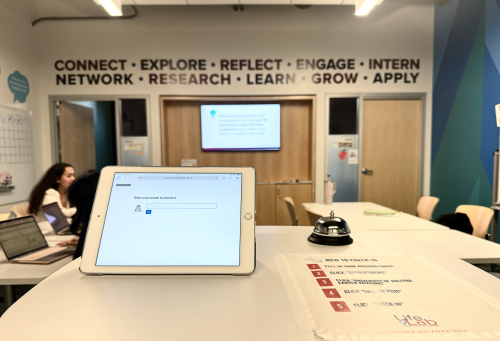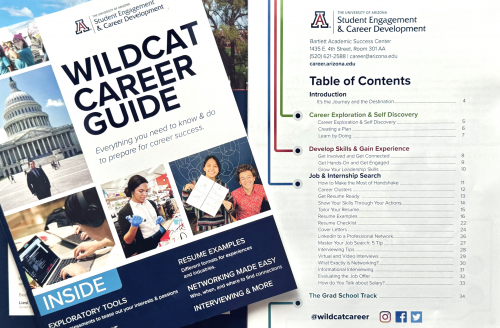UA has plenty of resources to help graduates land that first job
Ellia Pannier, El Inde Arizona

While some students know their career path before they even step onto campus, many are just figuring it out along the way. But for those to graduate, it’s time to answer the question: “What’s next?”
For members of the class of 2024 who take things one step at a time, here is some professional advice from University of Arizona career coaches that will help simplify the path to your future.
Located at the Bartlett Academic Success Center behind the Bear Down Building, the UA Student Engagement & Career Center is filled with both student mentors and career educators who are there to help map out your next steps with one-on-one counseling and support.
UA offers a wealth of resources. If you ever feel lost, don’t hesitate to reach out to UA professionals and take advantage of the tools available.
It’s worth noting that these resources are not exclusive to students; graduates can also access them for up to a year after completing their degree.
Cory Eisenberg, a seasoned career education coordinator and instructor, uses a personalized approach to help graduating students identify their career goals and aspirations. With an understanding of the diversity of student trajectories, Eisenberg connects with students on a deeper level to reveal their true potential.
“I talk to them about who they are, what their values are, and what work looks like for them,” she said. “As we’re working through this, I see key areas of their talent and their interests and I help them highlight themselves the best they can to represent themselves to future employers and opportunities.”
As students embark on their job-seeking journey, they can often feel frustrated and defeated by the long turnaround periods between applying for a job and hearing back months later. But this is commonplace in most industries, so rather than beating yourself down, learn how it works so you can know what to expect.
Students and coaches work as a team to map out a graduate’s next steps, and focus on demystifying the process of job seeking, networking and everything that falls within the professional structure.
If you want a second opinion on your career documents, LinkedIn profile, interview technique and more, use UA resources to ensure that you’re putting your best foot forward.

Here’s some tips we collected from five UA career professionals to help guide your job-searching journey.
Common Pitfalls
- Limiting where you look
- Don’t limit yourself to one job search platform. Instead use a variety of platforms including Handshake, Glassdoor and LinkedIn. Rather than focusing on specific job titles, expand your search to diverse industries, companies and employers and use different techniques such as reaching out to a company that interests you.
- Identifying job titles
- New job titles are created every day so it can be hard to identify which ones you should be applying for. Take a different approach and focus on your skills and interests, and you can receive guidance from career advisors to explore suitable job titles.
- Transactional networking
- While it can be just that, experts say that you should frame it as an opportunity to build a relationship with another person. Don’t just follow someone’s social media profile and leave it at that. Send them a message explaining why you did so by asking for advice or complimenting someone’s work. Not only does it start a conversation, but it can make you memorable.
- Be your own advocate
- Don’t sell yourself short. Be proactive and assertive by seeking opportunities. Network with a purpose and advocate for yourself through your skills.
- Holding out for the perfect fit
- If you’re hesitant to start a position because you’re holding out for that perfect job, you’re doing yourself a disservice. If you find an opportunity that has a balance between interest, salary and personal needs, you should embrace it and just start with a role that feels right. While it may not be your dream job, it can get your foot in the door. But also make sure the company’s mission aligns with your values. If they don’t match, then you may not enjoy working there in the long term.
- Resumes
- Because no industry is the same, you have to do your research to make your resume stand out from the others. Tailor the language and structure to fit the job and reflect your skills based on what the job application is asking for. This can be done by using similar words and phrasing found in the job description.
- Solo mission
- Some students try to use a logical strategy and attempt a solo mission to find jobs and network. Navigating your next steps requires a level of vulnerability that is necessary for planning your long-term future, so experts urge you to seek help to understand the bigger picture.
Tips from the experts
- Informational interviews
- If you’re unsure if a company would be a good fit, reach out and ask for an informational interview to learn more about the company and job. This also helps to establish relationships and expand your network.
- QR codes
- Instead of carrying around business cards, make yourself a QR code that links to your LinkedIn, website or whatever else you might need. It simplifies the networking process and makes for a great elevator pitch.
- Networking
- Your network is your net worth. Use LinkedIn, Handshake and other platforms to increase your reach and discover opportunities to connect with recruiters and professionals in different industries.
- Don’t be afraid to reach out to people you don’t know on these platforms, but if you are, challenge yourself; with more practice, it becomes more natural. Additionally, don’t limit who you connect with because you never know who you may or may not need later on in life.
- Connect with others on a human level. Approach it as an opportunity to meet someone new and get to know them as a person rather than a company. This authenticity can make you stand out so the next time their company is hiring they may look to you first.
- LinkedIn
- Growing your network by following companies and professionals that stand out to you will connect you to even more opportunities as the platform’s algorithm suggests more relevant content.
- Brand yourself through your LinkedIn. Use the platform as a social media outlet by posting, sharing and commenting at least once a week. It can come in the form of original content, sharing other people’s posts and adding to the conversation.
- Flexibility and adaptability
- Explore job opportunities outside of your field of study and don’t be afraid to pivot. Your major does not necessarily equal your career, so use your list of skills to connect with jobs in other industries whether or not it’s a perfect match.
- Strategizing your job search
- Finding a job can take months of searching, so stay on top of your applications by creating a spreadsheet of where you applied, who you spoke to and what time you did so. This makes the process easier by laying out your timeline in an organized fashion. Follow up in potentially three-month increments; the times may fluctuate depending on the industry. Keep a record of your efforts so you can know when it’s time to move on.
- Schedule time into your day to work on your resume, LinkedIn profile and outreach.
- Micro-credentials
- While you wait to hear back about a job application, use that time to develop your skills to add them to your resume. You can use LinkedIn or the UA’s microcredential resources as well as the university’s digital badges.
- Evaluating your job offer
- Your salary is not the only thing that matters, especially in the long run. Consider the company’s culture, whether it’s remote or in-person if they train their employees or encourage things like community service. Then think about how important those things are to you.
- Mentors
- Find people you trust, whether it’s one of your peers, a UA alumnus, an old supervisor or a professional in your field that you can turn to for guidance. Mentors can act as references, advisors, moral support and maybe even connect you to a broader network.
- Communication skills
- Experts say that employers are often looking for communication skills and experiences, so highlight yours in cover letters, resumes and LinkedIn profiles.
El Inde Arizona is a news service of the University of Arizona School of Journalism.
